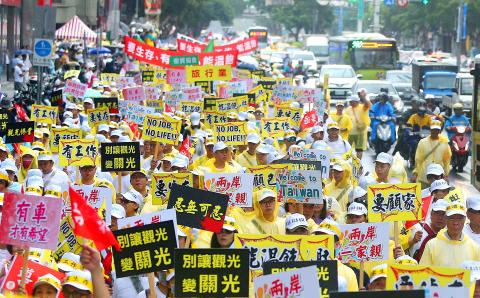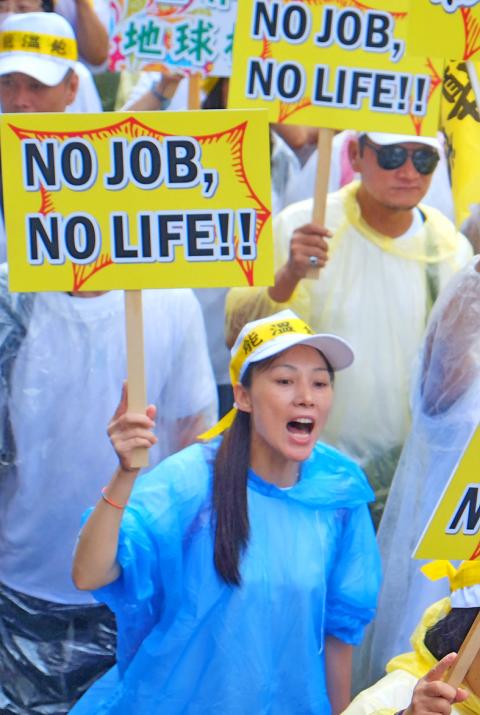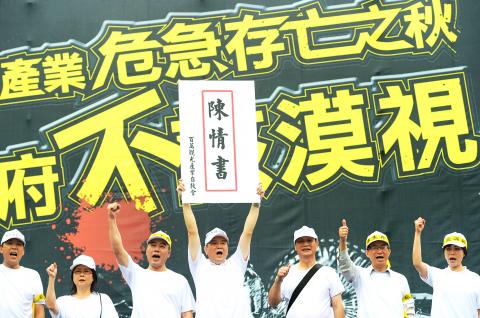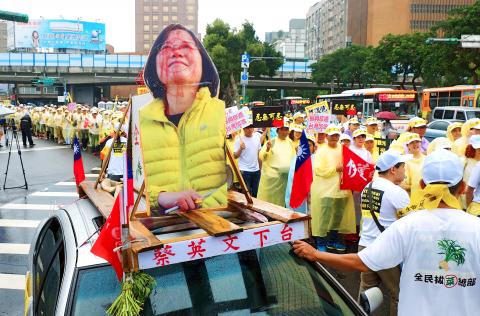About 10,000 people marched through downtown Taipei yesterday afternoon calling on the government to help the tourism industry amid a drop in the number of Chinese tourists.
It was the first-ever protest organized by people and firms in the tourism industry, including travel agencies, tour guides, hoteliers, hostel operators, restaurant owners, tour bus companies and representatives of other businesses.
The march began at the Huashan 1914 Creative Park and headed toward Ketagalan Boulevard by way of Chungshiao E Road, Hanzhou S Road and Renai Road.

Photo: CNA
A travel agency manager from Kaohsiung surnamed Rong (容) said those who took part in yesterday’s protest were “only the tip of an iceberg,” adding that the situation was expected to worsen in the next three months.
“We want to tell the government that its new southbound policy is not going to be an immediate cure to the travel industry’s current plight,” she said.
Tourism operators from southern Taiwan chartered at least 30 buses to bring people to Taipei, Rong said, adding that Chiayi County has been the hardest hit by the drop in Chinese visitor numbers.

Photo: Sam Yeh, AFP
Asked how bad the situation is, Rong said that some guides and bus drivers have been on unpaid furloughs for almost two months because there was no business from Chinese tour groups.
Alishan, a must-see destination for most of the Chinese tourists, now gets fewer than 10 tour buses per day, she said.
Boat owners at Sun Moon Lake (日月潭) are also hurting.

Photo: Chang Chia-ming, Taipei Times
“A tour guide used to be able to handle three tour groups every month, earning a monthly salary of between NT$50,000 and NT$100,000 [US$1,577 and US$3,153], but now they cannot do that anymore and they still have dozens of bills to pay. You can understand their anger and anxiety,” she said.
The NT$30 billion relief fund that the government is planning to spend to help the industry cannot possibly cover all the industry’s losses, she said.
A guide surnamed Lin (林) said that China’s National Day holiday is coming soon, and Japan and South Korea are trying to attract more tourists from China during that period.

Photo: Sam Yeh, AFP
Only Taiwan is trying to push Chinese tourists away, he said, adding: “I really do not know what our government is thinking.”
Lin said he is willing to follow the government’s policy to attract more tourists from Southeast Asia, but it must provide complementary measures to help address the problems businesses are facing.
He said he has a mortgage of about NT$10 million and has not had any income for two months, while his friends who own tour buses are struggling to pay off the loans they took out to buy the vehicles.
A luxury goods store representative from Hualien, who spoke on condition of anonymity, said the NT$30 billion is just a short-term solution.
“We want a fishing rod, not the government just providing us with fish,” she said.
Yesterday’s protest concluded with representatives of the travel industry delivering a petition to the Presidential Office.
The petition said that Taiwan attracted about 2 million Chinese tourists in tour groups last year, and the industry hoped about 1 million Chinese would come on group tours this year, representatives said.
However, that means the government needs to attract about 2 million more travelers from other countries to make up for the shortfall in Chinese tourists because Chinese spend about twice as much time in Taiwan as travelers from other countries, they said.
To make up such a huge shortfall, 12 suggestions were made, ranging from further streamlining visa application procedures for Southeast Asian tourists, allowing Chinese tourists to use their passports for a 72-hour transit in Taiwan before heading to a third country, offering subsidies to international tourists who spend at least two nights in central or southern Taiwan and raising the number of domestic travelers nationwide by giving out vouchers for weekday travel.

MAKING WAVES: China’s maritime militia could become a nontraditional threat in war, clogging up shipping lanes to prevent US or Japanese intervention, a report said About 1,900 Chinese ships flying flags of convenience and fishing vessels that participated in China’s military exercises around Taiwan last month and in January have been listed for monitoring, Coast Guard Administration (CGA) Deputy Director-General Hsieh Ching-chin (謝慶欽) said yesterday. Following amendments to the Commercial Port Act (商港法) and the Law of Ships (船舶法) last month, the CGA can designate possible berthing areas or deny ports of call for vessels suspected of loitering around areas where undersea cables can be accessed, Oceans Affairs Council Minister Kuan Bi-ling (管碧玲) said. The list of suspected ships, originally 300, had risen to about 1,900 as

DAREDEVIL: Honnold said it had always been a dream of his to climb Taipei 101, while a Netflix producer said the skyscraper was ‘a real icon of this country’ US climber Alex Honnold yesterday took on Taiwan’s tallest building, becoming the first person to scale Taipei 101 without a rope, harness or safety net. Hundreds of spectators gathered at the base of the 101-story skyscraper to watch Honnold, 40, embark on his daredevil feat, which was also broadcast live on Netflix. Dressed in a red T-shirt and yellow custom-made climbing shoes, Honnold swiftly moved up the southeast face of the glass and steel building. At one point, he stepped onto a platform midway up to wave down at fans and onlookers who were taking photos. People watching from inside

Japan’s strategic alliance with the US would collapse if Tokyo were to turn away from a conflict in Taiwan, Japanese Prime Minister Sanae Takaichi said yesterday, but distanced herself from previous comments that suggested a possible military response in such an event. Takaichi expressed her latest views on a nationally broadcast TV program late on Monday, where an opposition party leader criticized her for igniting tensions with China with the earlier remarks. Ties between Japan and China have sunk to the worst level in years after Takaichi said in November that a hypothetical Chinese attack on Taiwan could bring about a Japanese

The WHO ignored early COVID-19 warnings from Taiwan, US Deputy Secretary of Health and Human Services Jim O’Neill said on Friday, as part of justification for Washington withdrawing from the global health body. US Secretary of State Marco Rubio on Thursday said that the US was pulling out of the UN agency, as it failed to fulfill its responsibilities during the COVID-19 pandemic. The WHO “ignored early COVID warnings from Taiwan in 2019 by pretending Taiwan did not exist, O’Neill wrote on X on Friday, Taiwan time. “It ignored rigorous science and promoted lockdowns.” The US will “continue international coordination on infectious